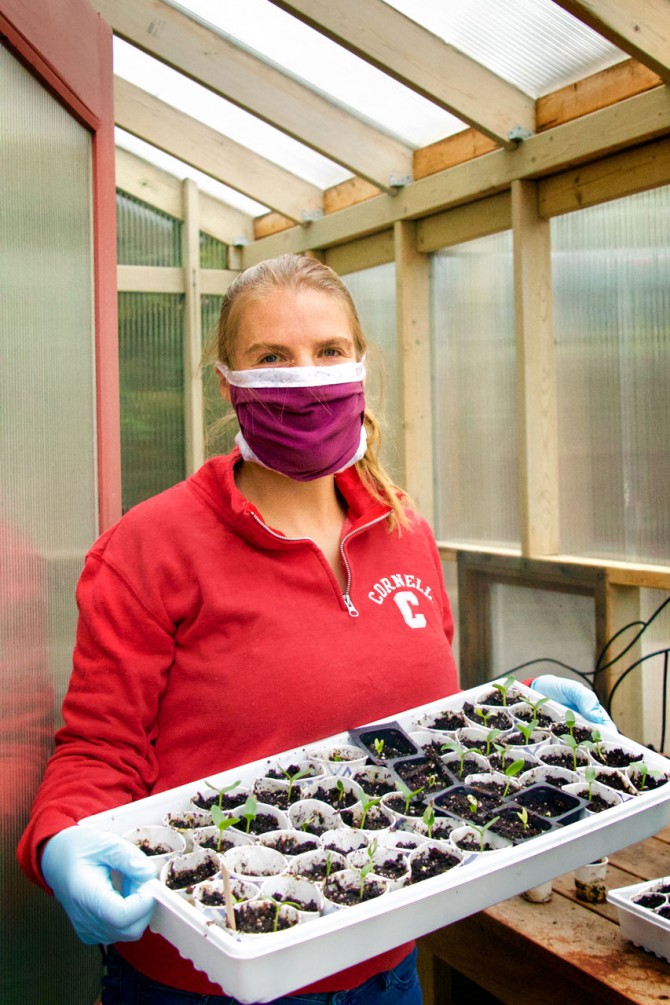Cornell biologists grow, donate plant kits to local families
For several weeks, nearly 1,200 seedlings grew in rows of paper cups covering the surfaces of Margaret Frank’s backyard greenhouse.
As an assistant professor of plant biology in Cornell’s College of Agriculture and Life Sciences, Frank is used to working with dozens of tomato plants in her on-campus lab. These potted plants, however, were destined for another experiment.
Thanks to a collaboration with Ithaca Children’s Garden (ICG), the Frank Lab has helped create almost 1,000 at-home gardening kits for local families. With additional support from Ithaca City School District’s Farm to Table program, the kits were delivered May 8 along with meals to more than 700 children in the district.
“When we were asked to stay home in March, I was inspired by all of the community-organized projects that were taking off in the Ithaca area,” Frank said. “I figured that the best way for my lab to contribute to these efforts was to offer at-home, hands-on STEM activities with plants.”
In collaboration with ICG, all six members of Frank’s lab have contributed: everything from filling the little pots with soil to developing the activities. Each kit includes a live seedling, cucumber and bean seeds to germinate and dissect, and a sheet of guidelines so families can access the information even without the internet.
Hannah Rae Thomas, a Ph.D. student in Frank’s lab, said that the experiments needed to provide enough complexity for high school students, but still be engaging for elementary school students. For one project, she’s making time-lapse videos of the plants growing and moving, based on photos the children submit, to post on the ICG website.
Tomato plants, for example, have a large range of motion over the course of the day. The leaves fold up in “prayer position” at night, then flatten out again during the day.
“If we, as scientists, can find enjoyment in just the cute movement of the leaves,” Thomas said, “then I thought the kids would also think it was really awesome to be able to see the plants moving throughout the day.”
The kits contain experiments that families can do right on their windowsill.
“We’ve been really conscious that not everyone has a garden space to grow something outside,” said Erin Marteal, M.S. ’10, ICG executive director. “For those who do have an outdoor garden space, they’ll be able to transport the plants out to their garden. But our hope is that no one feels guilt or shame that they’re not able to cultivate them.”
When Frank connected with Marteal at the end of March, ICG had already been developing new activities as part of their ICG@HOME programming. Through another collaboration with Hortus Forum, Cornell’s undergraduate horticulture club, ICG had donated several hundred houseplants to local families. The ICG staff also offers weekly, virtual Q&A sessions for children to ask questions about caring for their plans; members of the Frank Lab will join the May 13 session to talk about the experiments in the gardening kits.
ICSD’s Farm to Table program provided critical support for ICG’s involvement and for coordinating distribution, and funding from the National Science Foundation (NSF) allowed the Frank Lab to gather enough supplies to develop the kits.
“We were really lucky to get a grant just a few months ago that has a specific outreach budget that normally would have gone toward an in-person outreach project,” Frank said. “But NSF was really flexible and encouraging of shifting the budget to purchase materials for this project, and that’s going to last for five years.”
Frank let all the supplies sit for 72 hours before handling them, and everyone who assembled the kits used personal protective equipment to prevent any contagion.
Frank and Marteal both said the project has been a really natural partnership.
“It’s been awesome because we’ve been able to share some of our knowledge of youth development and what children of different ages might be excited about learning,” Marteal said. “Margaret and Hannah and the Frank Lab have been able to provide tons of great ideas and the tactical support for growing these things – they’ve been amazing to work with.”
Jana Wiegand is the editorial content manager for the College of Agriculture and Life Sciences.



